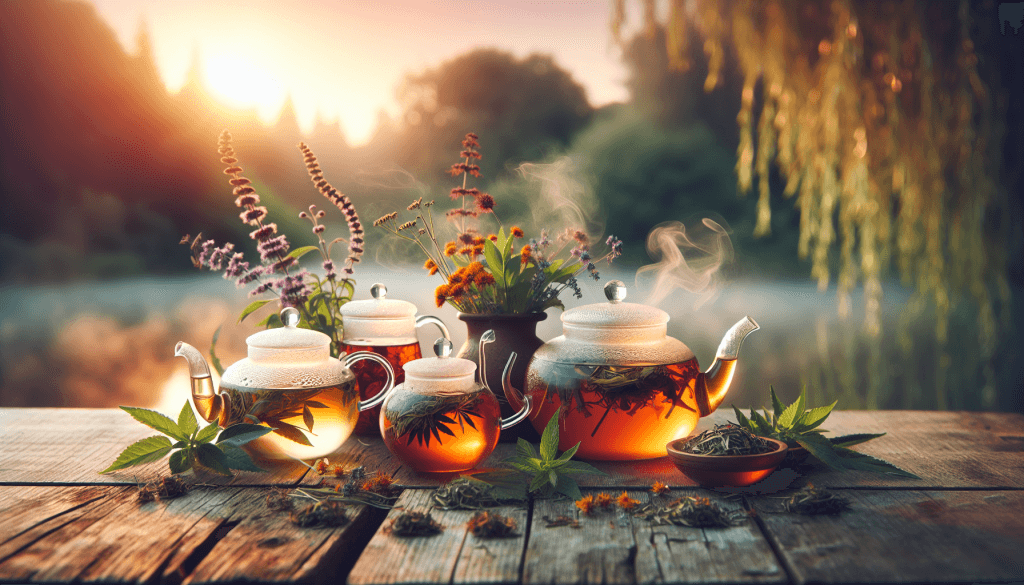Herbal teas are like a warm hug in a cup, offering a natural way to relax and unwind after a long day. Packed with soothing properties, they’ve been cherished for centuries as a remedy for stress, anxiety, and even sleepless nights. But what makes these teas so special, and why should you consider adding them to your daily routine? Let’s dive into the calming world of herbal teas and uncover their relaxing benefits.
Key Takeaways
- Herbal teas are caffeine-free and made from a variety of plants, flowers, and roots, offering natural relaxation benefits.
- They contain compounds that interact with your brain to reduce stress and promote calmness.
- Popular herbs like chamomile, lavender, and peppermint are known for their soothing effects.
- Drinking herbal tea can improve mental well-being, aid sleep, and even ease physical discomfort.
- Choosing the right tea and brewing it properly enhances its relaxing properties.
Introduction to Herbal Teas
Definition and Overview
Herbal teas aren’t your typical tea. Unlike black or green tea, they’re made from a mix of dried flowers, herbs, spices, and fruits. This means they’re naturally caffeine-free, making them perfect for relaxation. Whether you’re sipping chamomile for calmness or peppermint for a refreshing twist, there’s a tea for every mood.
Historical Use of Herbal Teas for Relaxation
Herbal teas have been around for thousands of years. Ancient Egyptians, Chinese healers, and even Greek philosophers used them for their medicinal properties. Chamomile was a go-to for soothing nerves, while peppermint was prized for its digestive benefits. These traditions have stood the test of time, proving that herbal teas are more than just a tasty beverage—they’re a natural way to heal and relax.
Importance of Relaxation in Modern Life
In today’s fast-paced world, stress is almost unavoidable. Deadlines, endless notifications, and sleepless nights can leave you feeling frazzled. That’s where herbal teas come in. They’re like a mini escape, helping you slow down and find your center. Pairing tea with other relaxation techniques, like deep relaxation practices, can amplify its calming effects.

Key Relaxing Properties of Herbal Teas
Natural Compounds in Herbal Teas
Herbal teas owe their calming magic to natural compounds found in plants.
Interaction with Neurotransmitters
Certain herbs, like chamomile, contain apigenin, a compound that binds to receptors in your brain to reduce anxiety. It’s like flipping a switch that tells your mind, “Hey, it’s okay to relax now.”
Role in Reducing Stress and Anxiety
Herbs like lavender and valerian root are known to lower cortisol levels, the hormone responsible for stress. Drinking these teas is like giving your body a gentle nudge to let go of tension.
Specific Herbs Known for Relaxation
Chamomile
Chamomile is the superstar of relaxation. Its mild, floral flavor is soothing, and it’s been shown to improve sleep quality and reduce anxiety.
Lavender
Lavender tea is like aromatherapy in a cup. Its calming scent and taste can help ease stress and promote a sense of tranquility.
Peppermint
Peppermint tea isn’t just refreshing—it’s also great for calming your mind and soothing your stomach. It’s perfect for those moments when you need to hit the reset button.

Herbal Teas and Mental Well-Being
Ritual of Drinking Herbal Tea
Creating a Calming Routine
Making tea can be a ritual in itself. Boiling water, steeping the herbs, and taking that first sip—it’s a mindful process that encourages you to slow down.
Mindfulness and Tea Preparation
Preparing herbal tea is an act of mindfulness. Focusing on the aroma, color, and taste can help you stay present, much like meditation for reducing stress.
Herbal Teas as a Natural Remedy for Anxiety
Herbal teas are a gentle alternative to medication for managing anxiety. They’re not a cure-all, but they can be a comforting addition to your self-care routine.

Herbal Teas for Better Sleep
Role in Nighttime Routines
Signaling the Body to Wind Down
Drinking herbal tea before bed is like telling your body, “It’s time to relax.” The warmth of the tea and its calming properties prepare you for a good night’s sleep.
Promoting Deep and Restful Sleep
Herbs like chamomile and valerian root are known for their sleep-inducing properties. They help you drift off faster and stay asleep longer.
Popular Sleep-Inducing Herbal Teas
Chamomile
Chamomile is a classic bedtime tea. Its gentle flavor and calming effects make it a favorite for winding down.
Valerian Root
Valerian root tea is a bit stronger in flavor but highly effective for promoting deep sleep. It’s like nature’s sleeping pill.

Physical Relaxation Through Herbal Teas
Digestive Benefits and Relaxation
Peppermint for Digestive Comfort
Peppermint tea is a lifesaver for an upset stomach. Its cooling properties relax your digestive muscles, easing discomfort.
Ginger for Alleviating Physical Discomfort
Ginger tea is a warming option that can help with nausea, cramps, and even muscle soreness. It’s like a little hug for your insides.
Reducing Muscle Tension and Fatigue
Herbal teas like chamomile and lavender can also help relax tight muscles and reduce fatigue, making them perfect after a long day.

Choosing the Right Herbal Tea for Relaxation
Factors to Consider
Personal Preferences
The best herbal tea is the one you enjoy drinking. Whether you prefer floral, minty, or spicy flavors, there’s a tea out there for you.
Specific Needs (e.g., Sleep, Stress Relief)
Think about what you need most. Are you looking for better sleep? Go for chamomile or valerian root. Need stress relief? Lavender or peppermint might be your best bet.
Tips for Brewing the Perfect Cup
Brewing herbal tea is an art. Use fresh, filtered water and steep your tea for the recommended time to get the most out of its flavor and benefits.
Conclusion
Recap of Relaxing Benefits of Herbal Teas
Herbal teas are more than just a drink—they’re a natural way to relax your mind and body. From reducing stress and anxiety to improving sleep and easing physical discomfort, their benefits are truly remarkable.
Encouragement to Incorporate Herbal Teas into Daily Life
Why not make herbal tea a part of your daily routine? Pair it with meditation techniques for better sleep or simply enjoy it as a moment of peace in your busy day.
So, the next time life feels overwhelming, brew yourself a cup of herbal tea. It’s like a little oasis of calm in a chaotic world.

For more on the benefits of relaxation and mindfulness, check out this guide on reducing stress.
Failed to generate valid FAQ section



